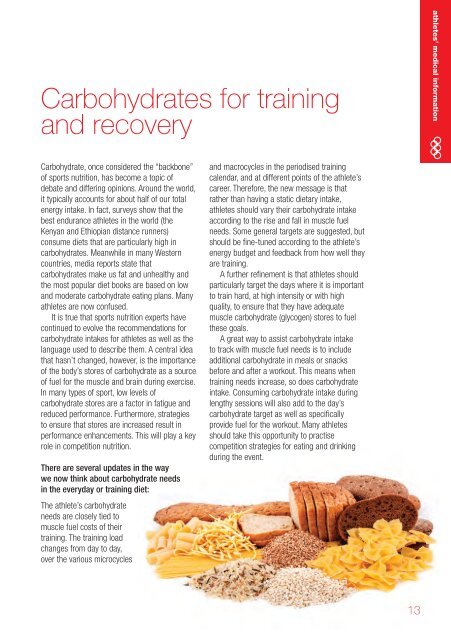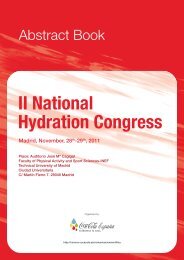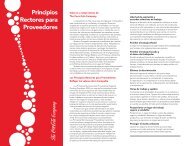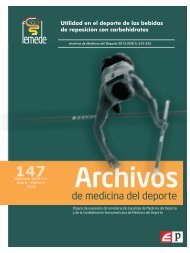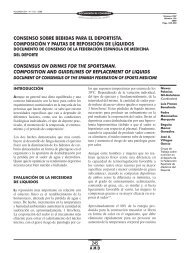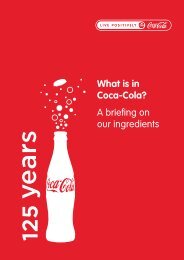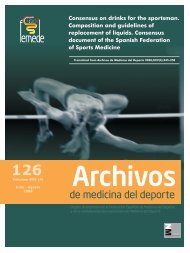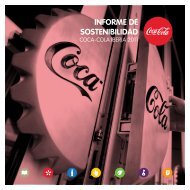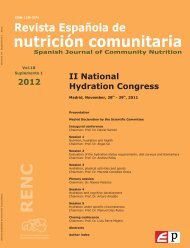Nutrition for Athletes - Coca-Cola
Nutrition for Athletes - Coca-Cola
Nutrition for Athletes - Coca-Cola
You also want an ePaper? Increase the reach of your titles
YUMPU automatically turns print PDFs into web optimized ePapers that Google loves.
Carbohydrates <strong>for</strong> training<br />
and recovery<br />
athletes’ medical in<strong>for</strong>mation<br />
Carbohydrate, once considered the “backbone”<br />
of sports nutrition, has become a topic of<br />
debate and differing opinions. Around the world,<br />
it typically accounts <strong>for</strong> about half of our total<br />
energy intake. In fact, surveys show that the<br />
best endurance athletes in the world (the<br />
Kenyan and Ethiopian distance runners)<br />
consume diets that are particularly high in<br />
carbohydrates. Meanwhile in many Western<br />
countries, media reports state that<br />
carbohydrates make us fat and unhealthy and<br />
the most popular diet books are based on low<br />
and moderate carbohydrate eating plans. Many<br />
athletes are now confused.<br />
It is true that sports nutrition experts have<br />
continued to evolve the recommendations <strong>for</strong><br />
carbohydrate intakes <strong>for</strong> athletes as well as the<br />
language used to describe them. A central idea<br />
that hasn’t changed, however, is the importance<br />
of the body’s stores of carbohydrate as a source<br />
of fuel <strong>for</strong> the muscle and brain during exercise.<br />
In many types of sport, low levels of<br />
carbohydrate stores are a factor in fatigue and<br />
reduced per<strong>for</strong>mance. Furthermore, strategies<br />
to ensure that stores are increased result in<br />
per<strong>for</strong>mance enhancements. This will play a key<br />
role in competition nutrition.<br />
There are several updates in the way<br />
we now think about carbohydrate needs<br />
in the everyday or training diet:<br />
The athlete’s carbohydrate<br />
needs are closely tied to<br />
muscle fuel costs of their<br />
training. The training load<br />
changes from day to day,<br />
over the various microcycles<br />
and macrocycles in the periodised training<br />
calendar, and at different points of the athlete’s<br />
career. There<strong>for</strong>e, the new message is that<br />
rather than having a static dietary intake,<br />
athletes should vary their carbohydrate intake<br />
according to the rise and fall in muscle fuel<br />
needs. Some general targets are suggested, but<br />
should be fine-tuned according to the athlete’s<br />
energy budget and feedback from how well they<br />
are training.<br />
A further refinement is that athletes should<br />
particularly target the days where it is important<br />
to train hard, at high intensity or with high<br />
quality, to ensure that they have adequate<br />
muscle carbohydrate (glycogen) stores to fuel<br />
these goals.<br />
A great way to assist carbohydrate intake<br />
to track with muscle fuel needs is to include<br />
additional carbohydrate in meals or snacks<br />
be<strong>for</strong>e and after a workout. This means when<br />
training needs increase, so does carbohydrate<br />
intake. Consuming carbohydrate intake during<br />
lengthy sessions will also add to the day’s<br />
carbohydrate target as well as specifically<br />
provide fuel <strong>for</strong> the workout. Many athletes<br />
should take this opportunity to practise<br />
competition strategies <strong>for</strong> eating and drinking<br />
during the event.<br />
13


